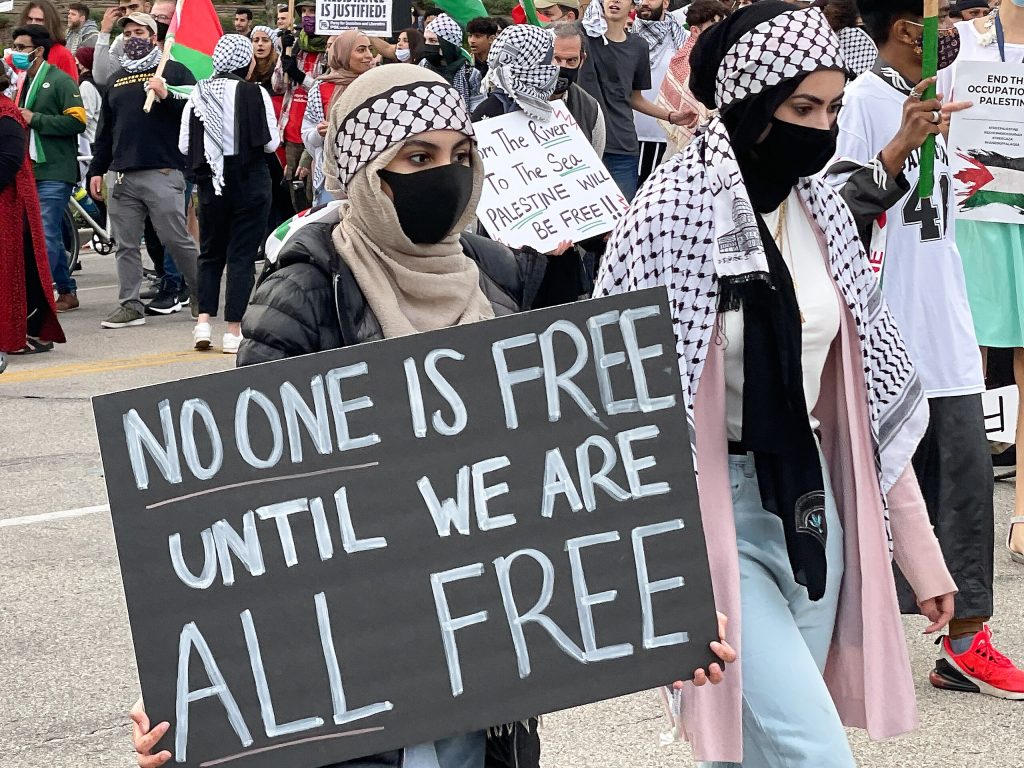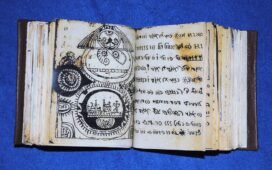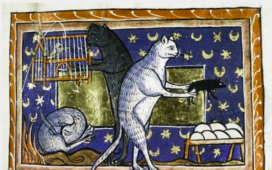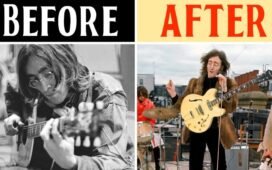Recently, the opinion has taken root in Israel, and among many Jews and non-Jews internationally, that the slogan ‘From the river to the sea, Palestine will be free’ is antisemitic, calling for the destruction of the state of Israel and the ethnic cleansing or murder of all Jews living in it.
Jewish organizations and other political players around the world are demanding a ban on the use of this slogan. In the UK, the Labour Party suspended MP Andy McDonald for using the phrase at a demonstration, and the Football Association banned players from using it on their personal Facebook accounts. In Germany the situation is even more drastic. In Berlin, for example, the use of the slogan at demonstrations is prohibited and demonstrators who shout it are arrested. The rightwing newspaper Die Welt went as far as running a podcast headline‘ Free Palestine is the new Heil Hitler’. No less!
In Israel, Haaretz journalist Ravit Hecht wrote that the slogan is a call ‘for ethnic cleansing, similar to the one that took place in the Gaza ‘envelope’ [on October 7]… It’s not about a return to the 1967 borders or a cessation of the occupation, but the annihilation of the Jewish national home and the expulsion of Jews from this place.’ This interpretation, however, is untruthful.
To begin with, it is worth comparing the slogan to the equivalent position among Jews (and non-Jews) who support Greater Israel. For if we accept that a Palestinian calling for the ‘liberation of Palestine from the Jordan River to the Mediterranean sea’ wants to expel the Jews from Israel, then fairness requires that the opposite should also hold true: that anyone who has ever supported Greater Israel – from the poet Nathan Alterman (one of the most important Israeli poets, who identified politically with the Labour party) and the signatories of the Greater Israel Manifesto in 1967 to the current government and the public that supported it at the ballot box – actually supports the annihilation or expulsion of the Palestinians.

Image: Susan Ruggles / Source: Wikimedia Commons
But this too would be inaccurate. In fact, to demand Israeli control over the entire area between the river and the sea is primarily meant to deny the Palestinians their right to self-determination, and to seek to prevent them from establishing a national home and having equal civil and individual rights. In practice, this position means enforcing apartheid, as the human rights NGO B’Tselem, to name just one prominent example, concluded in its January 2021 report, ‘A regime of Jewish supremacy from the Jordan River to the Mediterranean Sea: This is apartheid.’ In the eyes of the vast majority of Jews in Israel, and probably in the world, this is a legitimate political position.
Preventing any possibility of a Palestinian state has always been Israel’s policy, one that the settlement building in the Occupied Territories is meant to ensure. This policy has been intensified under Benjamin Netanyahu, who in January 2024 publicly vowed to resist any attempt to create a Palestinian state and to maintain Israeli control from the river to the sea.
Not all supporters of this policy necessarily support ethnic cleansing or the murder of all Palestinians between the river and the sea. But unfortunately, many do. This kind of violent solution has recently gained support among a very large section of the Israeli political spectrum. The 11 ministers and 15 Knesset members from various rightwing and religious parties who, together with many thousands of other Israeli Jews, participated in the ‘Resettle Gaza’ conference on 28 January certainly belong to this group. The ‘decisive plan’ revealed in 2017 by Bezalel Smotrich, who since 2022 has been Israel’s finance minister and a minister in the Ministry of Defence responsible for the Israeli ‘civil administration’ in the OPT, also clearly goes in these violent directions.
From the river to the sea
In the Palestinian context, the meaning of the slogan ‘From the river to the sea’ is much more complex. When interpreting it, it is important to be historically accurate and to avoid anachronism. The slogan’s meaning depends on the context in which it is used and, of course, on the intention of those who use it.
The slogan refers to Palestine, that is, the geographical area between the Mediterranean Sea and the Jordan River formerly defined as Mandatory Palestine. The Palestinians consider this territory to be their historic homeland. Even if a significant portion of Palestinians are willing in principle to agree on a compromise that would mean the establishment of a sovereign Palestinian state in the West Bank, East Jerusalem and the Gaza Strip, which together constitute about 22% of Mandatory Palestine, they still regard all of Palestine as their homeland.
From the Palestinian perspective, their homeland was taken away from them by the Great Powers – particularly Great Britain – and given to a group of Jewish (at the time mainly European) settlers. These settlers assumed control over most of their land and turned them, by force, into a minority. From this perspective, which is historically truthful, all Palestinians living in this area, and even those outside it, exist in a state of inequality and lack of freedom.
Palestinians in Gaza have been under siege for 16 years and are now under a murderous (and plausibly genocidal) assault. Palestinians in the West Bank are under direct occupation and face the constant pressure of ethnic cleansing (particularly in zone C). Palestinians in East Jerusalem are considered residents rather than citizens; and Palestinians within the Green Line enjoy equal rights only partially. Refugees who were expelled or fled in 1948 and were not allowed to return do not even have the right to live in their homeland; and the same goes for their descendants, of course.
The vast majority of Palestinians can therefore rightly claim that, at present, the territories of their homeland, i.e., Palestine, are not ‘liberated’. By this they mean that the Palestinians residing in it do not have freedom and equality as individuals, and that the Palestinian people collectively is being denied its right to self-determination.
How, then, can this situation be changed and Palestine achieve liberation from this discriminatory and exclusionary regime? There are many opinions on this. What follows is a very schematic and incomplete map of positions, which are in fact much more dynamic, complex and contested according to changing circumstances.
Palestine will be free
Among Palestinians, as amongst Jews, there is a gap between the dream of generations for liberation and full control of all of Palestine, and the way they realistically and politically imagine life in liberation. Some see the only realistic option – even if this means only partial liberation – as the establishment of two states, somehow recognizing the refugees’ right of return. This is the official stance of the PLO, and many Palestinians used to support it. Many Israelis also support the two-state solution. But due to Israel’s longstanding settlement and annexation policy, it now seems unfeasible.
Others think that the way to liberate Palestine is to establish a single secular and egalitarian state for all its residents, Jews and Arabs. Many Palestinians around the world, in the Occupied Territories and in Israel, support this (as do some Jews and even Israelis). The Palestinian–Israeli political party Balad supports a slightly different version of the idea: transforming Israel within the 1967 borders from a Jewish state into a secular state with equal rights for all its citizens, while establishing a Palestinian state in the Occupied Territories.
Still others think that the liberation of Palestine could entail various federative or bi-national arrangements. Such ideas have become increasingly popular among Palestinian and Jewish-Israeli intellectuals in recent years. The joint Israeli–Palestinian movement ‘A Land for All’, for example, has translated this idea into detailed political plans.
Then there are those who equate liberation with an Islamic dhimmi regime, according to which Jews who remain in Palestine will have an inferior status but will be protected by the authorities. Some sections in the Hamas Charter of 1988 support such an arrangement and some within Hamas envision it as a political solution. Others indeed envision the expulsion and even murder of the Jews as the ultimate liberation of Palestine. This group includes secularists who see Algeria as a model of decolonization, and some in Hamas and more radical groups like the Palestinian Islamic Jihad, not to mention ISIS and extremist Jihadist groups.
This latter strategy is also supported by some sections of the Hamas Charter of 1988. However, it should be mentioned that the 2017 addendum to the charter (par. 20) accepts the idea of a Palestinian state along the 4 June 1967 borders (i.e. the borders prior to the 1967 war) as a ‘formula of national consensus’. Hamas has also proposed a long-term ceasefire (Hudna) with Israel several times over the years. There are even significant voices within Hamas that call for acknowledging the State of Israel.
Instrumentalising accusations of antisemitism
Precisely because it is so general and gives no hint to a specific solution, it is difficult to find a Palestinian or a supporter of the Palestinian cause who does not identify with the slogan, ‘From the river to the sea, Palestine will be free’.
As Maha Nasser has shown, the slogan ‘From the river to the sea’ became popular in Fatah circles during the decolonization struggles in Africa and Asia in the 1960s. The intention then was the establishment of a secular, democratic and egalitarian state in all of Palestine, in which Jews would enjoy full equal rights, but without the privileges that Zionism granted them. Since then, however, the slogan’s meanings have diversified, as we have seen.
While for the Palestinians it is an expression of their legitimate national struggle, for many others it is a general expression of support for the Palestinian national cause and protest at Israeli mass atrocities. The slogan has been shouted by many, including Jews and Israelis, at demonstrations around the world for years. It reflects the fact that from a Palestinian perspective, the occupied homeland is not only the West Bank and the Gaza Strip, but all of Mandatory Palestine. However, it does not remotely imply the political manner in which this homeland will be liberated. It is thus, as the eminent historian Rashid Khalidi has concluded, a general call for the liberation of all Palestinians, which is in absolute contradiction of the present reality of complete unfreedom of various sorts.
Jews and non-Jews should understand and recognize this fact. Labelling the slogan antisemitic is a powerful tool used by Israel and its supporters to deny the existence of the Palestinian people and its connection to the land, to entrench Palestine’s occupation, oppression, and elimination by Israel, and to silence its cry for freedom and rights including amidst the plausibly genocidal assault now taking place in Gaza.
After the 7 October massacre, the slogan gained an additional meaning. Some in Europe and the United States have used it to express their support for the Hamas attacks, which they label as acts of decolonization and liberation of Palestine. In this context, the slogan is one in support of massacre, rape and mass atrocities.
Given the slogan’s various possible interpretations, including its use to support Hamas’s crimes, it would be good if its users find ways to clarify what they mean. Some have indeed suggested modifying the slogan. In Berlin a protester suggested, ‘From the river to the sea, we demand equality’ (the sign was still taken down by the police). Leila Farsakh, a Palestinian-American political scientist, prefers ‘From the river to the sea, everyone must be free’. This focuses on the core of the Israeli settler colonial, apartheid regime – the fundamental political inequality and negation of rights – and highlights the aspiration for freedom and equality for all those living between the river and the sea.
But reflecting on this slogan, which allegedly negates Jews’ very existence in Israel, must ultimately return to us, Israeli Jews, and to our lives in Israel. Because it is appalling that Israel and its supporters blame those who chant the slogan for supporting genocide, while Israel commits war crimes which the ICJ has declared as plausibly genocidal. Israel has thus far killed more than 30 thousand Palestinians, the vast majority of whom are children and women, displaced almost all Gazans, made the Gaza strip uninhabitable and is deliberately starving the entire Palestinian population.
Moreover, in Israel, genocidal public statements have become commonplace. Israel’s president Yitzhak Herzog claimed on 13 October 2023 that there are no innocent citizens in Gaza, thus effectively making all Gaza’s inhabitants legitimate targets for attack. On 9 October, defence minister Yoav Galant declared a complete siege on Gaza: ‘There will be no electricity, no food, no fuel, everything is closed’. Tali Gottlieb, a Likud member of the Knesset, wrote on social media on 10 October that on, ‘It is time for Doomsday weapons. Firing powerful missiles without limits. Not simply flattening a neighbourhood, but crushing and flattening all of Gaza.’ Shimon Riklin, the senior political commentator of Channel 14, the government TV mouthpiece, said on a primetime program on 17 December that ‘I don’t sleep well without seeing houses collapsing in Gaza … More, more, more houses and more towers. So that they will have nowhere to return to … They need to remember that they are Amalekites … I am all for war crimes.’ And Zvi Yehezkeli, a senior analyst for Channel 13, lamented that the IDF strikes in the first days of the war failed to kill 100,000 Palestinians. And recently the influential Rabbi Eliyahu Mali urged the Israeli army to kill all children and women in Gaza in accordance to what he perceives as the religious Jewish law.
These are just a few of the more than 500 Israeli public genocidal statements that have been recorded many of which were quoted by South Africa in the ICJ case and were requoted in the court’s ruling. The discourse and the mood prevailing in Israel has become explicitly and openly genocidal.
So, beyond the different meanings that people outside Israel give to the slogan, there is the simple but crucial fact that even the heinous horrors of 7 October cannot obscure: the persistent and longstanding denial by the State of Israel and most of its Jewish society of the Palestinians’ just and basic demand for full and equal personal, legal, civil and national rights within the framework of whatever political solution may emerge.
Denying such demands seems as self-evident to most Israeli Jews as the air they breathe. It is this denial that has led to the dehumanization of Palestinians and has culminated in the genocidal mood that is prevailing in Israeli Jewish society today and in the assault taking place now in Gaza. This should be viewed as the real problem and not the legitimate chant of ‘from the river to the sea: Palestine will be free’.
Earlier and shorter versions of this article were published in Hebrew in Sicha Mekomit on 3.12.2023 and in German in Geschichte der Gegenwart on 31.01.2024















